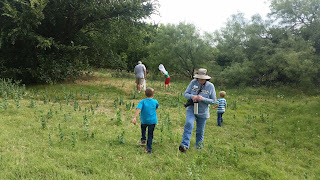I know, I should have written this post at the beginning of the week, instead of the end, but....I am doing it now. Pollinators are just too important not to make a big deal about them.
 |
| On the hunt for pollinators |
 |
| Beetles are great pollinators! |
Most people think bees are the only pollinators and they are important, but other bugs like flies, butterflies, moths, wasps, and beetles are also important pollinators. So are hummingbirds and bats. In specific instances, birds and even lemurs pollinate certain species.
I garden, as do many of you. Have you noticed fewer bugs in your garden? I certainly have. I also haven't seen many in my flower beds and I plant to attracts wildlife. I don't use pesticides or chemical fertilizers, although I think I am the only person in our neighborhood who doesn't. But back to the lack of bugs (well, except mosquitoes, which seems to be the only bug in the yard). This is not a good thing. If we like to eat, we need pollinators. More than 1/3 of all of our food has to be pollinated by some living thing.
So what is happening with pollinators and what can we do?
I have yet to figure out why people feel like they have to kill every living thing that they see as "icky." Bugs, spiders, and snakes, for example. Every year here in the Falls people go crazy because of rattlesnakes and kill every snake they see. But many of the pictures of dead snakes posted proudly in Facebook are not rattlesnakes at all--they are rat snakes or some other harmless snake. But at least for snakes, they are using blunt force trauma for the most part--not good for the snake, but the damage is reasonably contained to the snake.
However, then we have a rodent problem, so then we drag out the rodent poison. Not only is poison a horrible way to die, but these poisoned rats and mice are now eaten by other animals who were not the intended target, but who are now also poisoned. That might be your pet cat or it could be a hawk or an owl. Poisoned rodents are often taken by birds of prey, which also then die. So, first, let's not spray our yards with insecticides. If you have a significant problem and cannot find a nontoxic solution (and there are many out there) then use the least amount of poison possible. Home application of insecticides is much higher than agricultural applications. Many homeowners are like Tim the Toolman--if a little is good, then a lot must be a lot better. But that is not the case. The rest runs off into our water supply or blows into your neighbor's yard.
Next, lawns are a waste. There is nothing little for pollinators to use as food. Plant some native plants that appeal to pollinators. Not a single plant, but groups of them. Plant different kinds of plants to attract different types of pollinators and which will bloom at different times of the year, to provide food all year long. Besides, once these plants get started, you'll have less work mowing and putting down fertilizer and more poisons--costing you money and harming your environment.
Messy yards are not a crisis. If you want, make the front yard pristine (although I don't advocate that), but have some messy places, with leaves and brush, where pollinators and other small wildlife can live and be safe.)
I know here in north Texas it is almost a religion that climate change is a hoax. No, the hoax is that a small group of nutcases have managed to convince large numbers of people that science is wrong. There are only a couple of fringe scientists who are not certain that climate change is real and that people are the primary cause. Climate change is causing or contributing to a host of environmental issues--one of which is pollinator collapse. Make purchasing decisions based upon the product's impact on the environment. You may rightfully say that your single purchase makes no difference, but all of our purchases can make a huge impact. So stop using that as an excuse. Elect people who respect and understand science and who do not pander to a very loud minority. If you cannot understand the science and the long-term effects of government policies on the future my grandchildren will be living in, I don't want you in a position to make those decisions.
So, to summarize:
- Stop poisoning your home and yard
- Plant lots of native plants
- Let there be some messy spots
- Advocate for the environment
- Elect people who understand the policy implications of science and act accordingly
Let's support our pollinators in Wichita Falls.

No comments:
Post a Comment